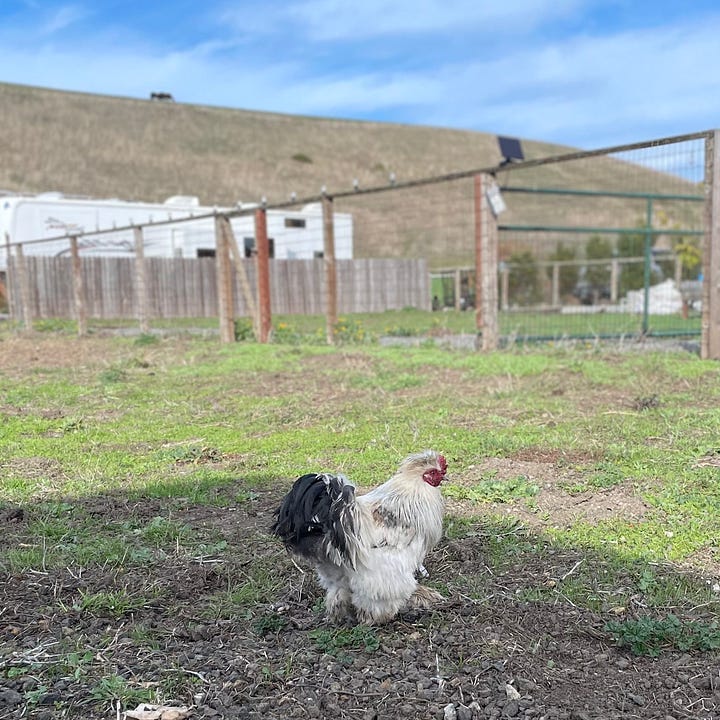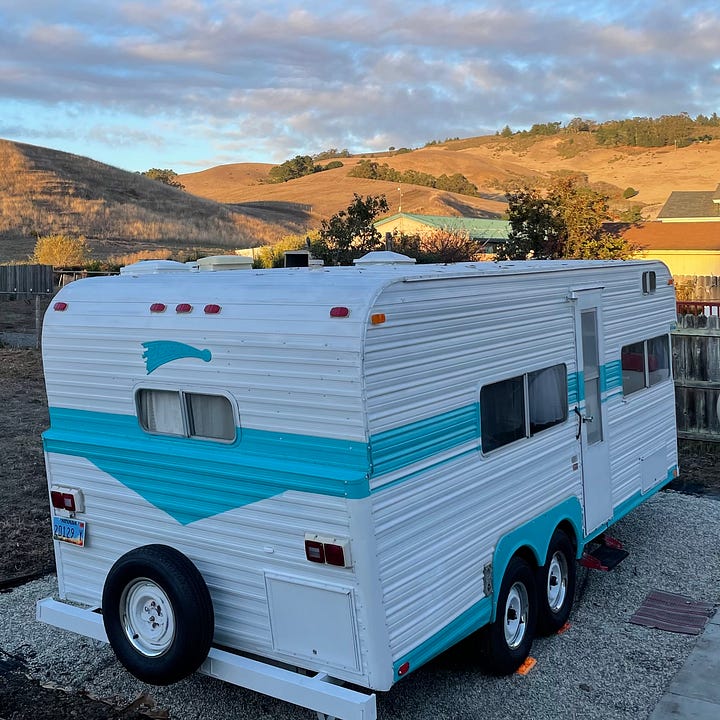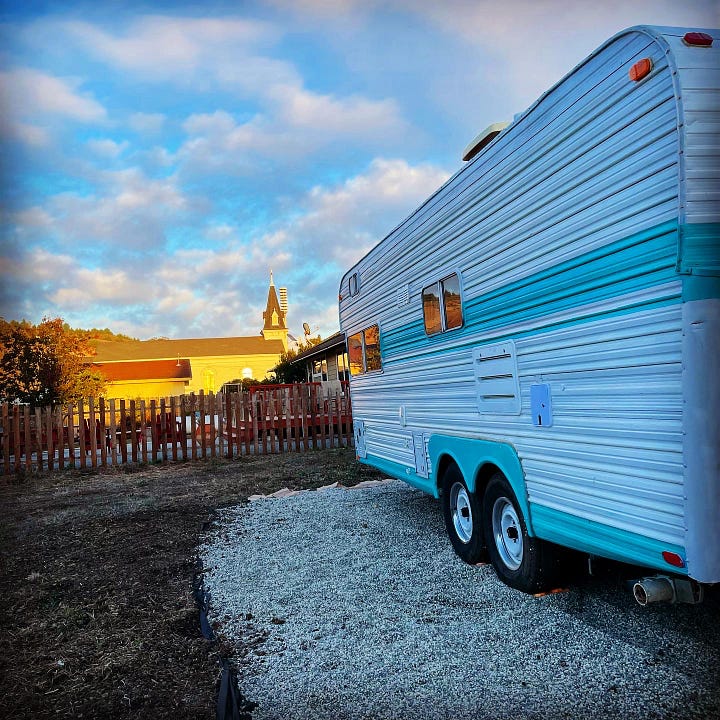I’ve just finished revising the last draft of a novel I’m now looking for an agent for, and I find myself becalmed and confused as to what to be working on. So here’s this, on chickens and our need for narrative order.
Rosa, beloved chicken
Obligatory Fireball
Narrative disorder
Infomocracy
Perlin
Cusk
Country living
Rosa died the other day.
On our street in this tiny rural town, nearly everyone has chickens—and a few people have ducks, geese, pigs, and/or goats as well, not to mention dogs and cats, at least one tropical bird, and, to our great delight, miniature horses we live next door to. When we moved here three years ago, I was adamant we weren’t going to get any chickens (we did get the obligatory pickup truck, which we need for hauling stuff to the dump and getting lumber for fences and other things), but then the neighbors were moving away. They at one point had more close to two dozen chickens, and the girls (then seven years old) quickly became friends with them. So when they offered to give us a handful, since the chickens weren’t going with them, we couldn’t exactly say no.
The other day we had heard that a coyote had taken one of the chickens from the neighbor’s yard three doors down, so I sent the girls, who are now ten, out to round up our flock of eight laying hens and one very entertaining bantam rooster named David Bowie, and try to get them back in our small pen—which I like to call the Chicken Minimum Security Prison, because I pieced it together from old sections of fence when I had to throw something up at the last minute to take delivery of them.
I was out in the Fireball working on a client project (yes, we also have the obligatory RV; a ‘70s-era trailer, in our case) when I heard a cry from one of the girls (Baby B, as the hospital dubbed her at birth). She could only find eight of the chickens, she said. Where was the other one? Did the coyote get her?
Uh-oh. But I was pretty confident that hadn’t happened. Look in the coop, I told my daughter, in the manner of undistractable dads everywhere. I’m sure she’s okay.
She did look in the coop, and then called out again, and from her voice I knew immediately something was wrong—not wrong in the my child is injured sense of the word, but wrong in the something has upset my daughter sense, which, though unfortunate, I vastly prefer to the other.
But all this deserves a little illustration…




Dad! I think Rosa is dead.
Now it was time to be distracted. And indeed, Rosa had shuffled off to the big nesting box in the sky, although no coyotes were involved. She had passed away of old age, in her sleep, it seemed, and not been noticed when I let the birds out that morning, since I never really count them up. (I am not the most enthusiastic chicken farmer, in truth, but that’s a tension for another day.)
We talked things through, tears were shed (mostly by Baby B, who also cried for two days straight when our pet rabbit died when A & B were two), a grave was dug out in back by the quince and pear trees (and yellowjacket nest), and a very eloquent eulogy was pronounced by Baby A, who is certainly the young wordsmith of the family.
Telling stories
All of this called for some processing, as you can imagine, and in one of our conversations, Baby B said an interesting thing: Because of the coyote, as soon as I couldn’t find Rosa, I knew she had died. I didn’t know if the coyote got her, but I knew when we found her she’d be dead. Because we heard about the neighbor’s chicken the coyote got.
Aha, I thought. You have done what we do. You have imposed your own story on events. You have perceived a coherence in a place where there was none. Because of this event, that event must follow. You’ve made meaning in the world. You suffer from a perhaps incurable condition: what some post-present diagnostic manual would call narrative disorder.
Narrative disorder (in my crude description of it) is a condition in which a person experiences a nearly irresistible urge to create narratives out of the objects, people, and events they come into contact with. This isn’t a concept original to me, of course. Narrative disorder first appeared (as far as I know) in this short story by the really wonderful sci-fi writer, sociologist, and all-around smart person Malka Older. It also appears, to great effect, in her excellent first novel, Infomocracy.
Baby B may or may not suffer from (or enjoy) this condition. But narrative disorder was certainly at work the day Rosa died. Though her death occurred independently of the coyote that had been stalking the hills behind our house, the coyote’s presence became part of the story. Because of the coyote, as soon as I couldn’t find Rosa, I knew she had died. The two events weren’t connected. And yet they were.
The messages that fragments convey
Perhaps it’s only human, to want to map connections in this way, to want events to cohere into some meaningful whole. It’s interesting that we so often want it to be an ordered whole, the kind of tale with a beginning, middle, and end.
As a related aside: There’s a lot of richness in the etymology of all the words to do with story. Story and narrative are words that grow from different kinds of knowing. But tale is related to tally; account to counting. There’s an adding-up that goes on in story (philologically, anyway), an orderly procession of objects and events. Perhaps it only makes sense that we want to string things together, then, to be able to understand what they add up to.
But action philology (never mind; maybe I’ll get to it in another newsletter) and indeed Wittgenstein requires that we not be slaves to words but instead think between what words might mean in order to find a way to express the inexpressible thing we’re trying to get at. Perhaps a similar thing can be true of narrative. Perhaps the sum we’re adding up to doesn’t have to be an ordered story, doesn’t have to be a narrative, at least, not in the way we traditionally think of those things. (I say perhaps, but I’m pretty confident, at this late stage of storytelling, that these things are true.)
I mentioned the artist Jenny Perlin last time, and I’ll mention her again now, as there was something in one of her recent newsletters that got me thinking again about all this, a reminder that “maybe it doesn’t all have to tie up together.” I feel very much the same way. Maybe a causal, sequential (ordered) connection isn’t necessary to meaning-making. As Jenny put it: “I always believed in the messages that fragments convey.”
I have always believed in those messages too. I’m not entirely sure, but I think it might be part of my ambition, in terms of art-writing let’s call it, to unearth these kinds of messages through my own work. I certainly love encountering work that does this very well. Rachel Cusk’s Outline trilogy is probably the thing I’ve come across recently that does this best. Here are three short novels that have only the faintest of narratives, but which make meaning by assembling various other perhaps unrelated, out-of-order stories. I really admire what she’s doing here, it isn’t easy, it isn’t trivial, it’s more than just a matter of assembling fragments that add up to some kind of whole. I’m not sure I know yet how to talk about it in a way that describes everything I see there. Perhaps in fragments? Anyway…
<3
My heart continues to conspire against me, but I’m on a new medication that’s helping. Still, I’m annoyed by the constant reminder of my mortality. I suppose that’s why people start writing about this stuff. More soon.
Til next time,
Wallace




Well OK. No beginning, no end but a good middle and that's OK
Your writing has a way of drawing me in as the reader. :)